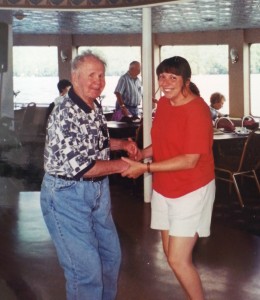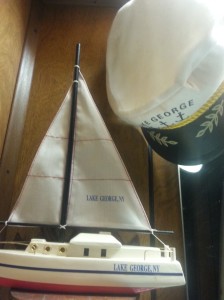 Guest article by caregiver, Lynette Wilson Juul.
Guest article by caregiver, Lynette Wilson Juul.
Working as a caregiver, I’ve been privileged to travel with some of the people I serve.
There is one particular journey; however, that is etched forever in my mind as the most joyous vacation.
It happened ten years ago. My traveling companions were a group of aging developmentally disabled individuals, many of whom were also diagnosed with dementia! Talk about a fun group!
I had not worked with this population before and didn’t realize that they are just as susceptible to dementia as others without a developmental disability. It seems aging is the great equalizer with debilitating diseases. My traveling companions already afflicted with one cognitively impairing disease, also suffered from symptoms of this SECOND cognitively impairing disease.
Happily, they also ENJOYED the same types of activities as other people with dementia, such as singing, dancing, reminiscing, and vacationing in their favorite “spot!”
In this case, the “spot” was Lake George, New York, a tourist town at the base of the Adirondack Mountains.
Many of my traveling companions had spent much of their adult lives in state institutions. Vacations were NOT part of their limited lifestyles. After the institutions closed, they integrated into communities across the nation. And they began to experience the same types of pleasures anyone would enjoy … including an annual vacation!
Like so many other “normal” people, the same vacation “spot” every year was just fine!
I was welcomed aboard as an extra staff member on one of the group’s annual trips. I was able to experience the genuine JOY of these amazing individuals, first hand! It was truly an inspirational and unforgettable journey.
 Interestingly, the typical tourist traps didn’t resonate with my group as strongly as did the little things, like having coffee at an outdoor cafe or buying trinkets at a gift shop.
Interestingly, the typical tourist traps didn’t resonate with my group as strongly as did the little things, like having coffee at an outdoor cafe or buying trinkets at a gift shop.
The trip, of course, had a highlight, which occurred during a four-hour luncheon cruise on the lake’s largest tour boat, the Lac du Saint Sacrement.
The luncheon itself was amusing, but NOT the actual highlight. For these folks, typically happy with a hotdog or hamburger, too many food choices proved quite a challenge! Like anyone with dementia, trying something new can be a trying experience.
The real fun came after lunch, when we were treated to some music on the ship’s main deck, courtesy of an awesome one-man band!
Listening, singing, and dancing to music are by far the most enjoyable activities for many folks with a developmental disability. Like anyone with dementia, the old tunes help him/her travel back in time. And from a caregiver’s perspective, I am given the chance to catch a brief glimpse of who that person was before being robbed of their cognitive functioning.
What a glorious sight to see!
During an especially popular old ditty, one of my traveling companions, a flirtatious fellow, grabbed my hand, dragged me to the center of the deck, and with a wide grin said, “Let’s dance, Honey!”
We did while my dancing partner reveled in stories of the numerous “Honeys” he had danced with over the years.
Soon, other folks began to join us on the dance floor, and laughter and singing filled the air!
I experienced an epiphany that day. As I watched my companions dance on the ship’s deck, I realized a fundamental truth about the debilitating disease of dementia. It doesn’t choose its victims based on their level of intellectual functioning. No. My developmentally disabled traveling companions were just as easily targeted as anyone else.
And like others with dementia, a familiar long-ago melody could bring them back to a special place in time.
I’ll never forget dancing on the deck with my jubilant partner. In spite of being diagnosed with two cognitively devastating diseases, all that mattered to him was the sheer JOY of being in that moment.
It’s certainly a lesson we could all benefit from, whatever challenges we are facing.
 Lynette Wilson Juul, MS has experienced the joy of caregiving both professionally and personally. For twenty-five years, she assisted people with a variety of disabilities. During the past decade, she has narrowed her focus to aiding families who have a memory-impaired loved one living at home. This has included her father-in-law, Ole Juul, who lives with dementia in the Bay Area of California. Lynette and her son Peter were featured caregivers on The Caregiver’s Voice.
Lynette Wilson Juul, MS has experienced the joy of caregiving both professionally and personally. For twenty-five years, she assisted people with a variety of disabilities. During the past decade, she has narrowed her focus to aiding families who have a memory-impaired loved one living at home. This has included her father-in-law, Ole Juul, who lives with dementia in the Bay Area of California. Lynette and her son Peter were featured caregivers on The Caregiver’s Voice.









Very touching recollections…thanks for reminding me that diseases are not a respecter of
intellectual abilities…they can strike anyone…i thank God for the brave souls that provide
care to these afflicted people…without this quality of care there would be no hope for recovery
or the ability to go courageously forward in spite of…
Thank you, Bob, for your thoughtful comments. And thank you, Brenda, for posting the article. It’s a topic I feel very strongly about, and I don’t think enough people know about how Dementia related diseases can strike the developmentally disabled and mentally ill populations as easily as it can strike those who are NOT dealing with these illnesses. Special care, and a great deal of patience and compassion, is required to work with these individuals.
I am proud to have been one of the many unsung heroes who dedicate themselves to these folks every single day. As an FYI, individuals who suffer from Down’s Syndrome in particular have an especially high rate of developing early onset Alzheimer’s. This is an extremely challenging population to work with, and I am grateful to all the caregivers who help these people maintain a high quality of life. Truly inspiring! Lynette
Thank YOU, Anne, for being able to see past those misperceptions! It’s amazing that in our current society, where so many stereotypes are thankfully being broken, the stigma of those with a developmental disability still exists. I appreciate your feedback. Lynette
Very insightful and joyful reflections that remind us to not hold our stereotypes too closely, and always be open to new adventures and new learnings! Thanks